Auditing: Audit Quality, Independence, and Expectation Gap Analysis
VerifiedAdded on 2023/06/03
|11
|3059
|231
Essay
AI Summary
This essay provides a comprehensive analysis of audit quality, addressing its assessment, the impact of auditor independence, and the influence of the audit expectation gap. It begins by defining audit quality and outlining its key components, including process, inputs, and outputs, along with contextual factors and stakeholder interactions. The essay then explores various methods for assessing audit quality, such as reviewing audit plans and accounting disclosures. It further discusses how auditor independence, influenced by factors like non-audit services and auditor tenure, directly affects audit quality. Finally, the essay examines the audit expectation gap, detailing how differing perceptions of auditor responsibilities impact audit quality, highlighting the importance of auditor knowledge, ethical conduct, and technical capabilities. The essay emphasizes how these elements affect the overall reliability and value of audit reports.
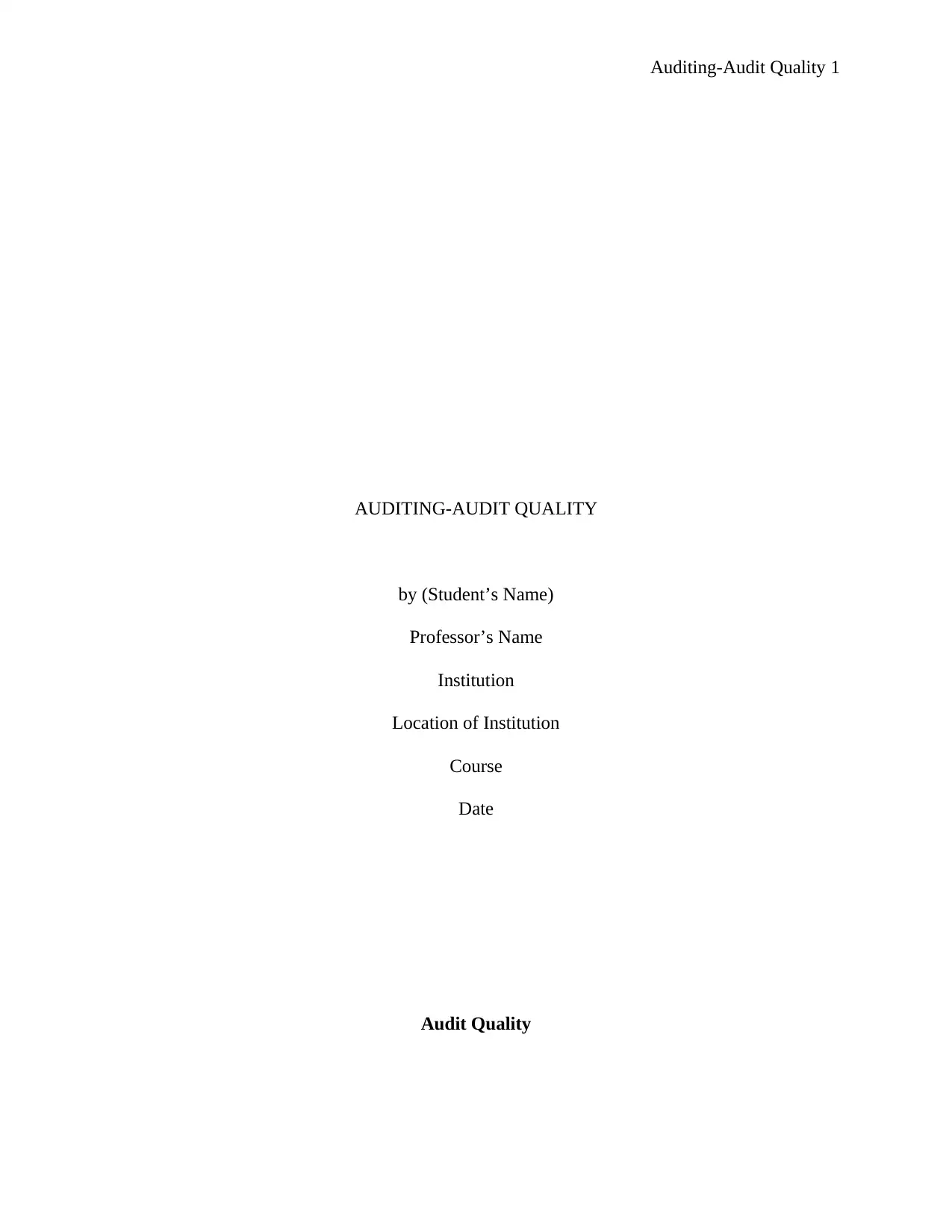
Auditing-Audit Quality 1
AUDITING-AUDIT QUALITY
by (Student’s Name)
Professor’s Name
Institution
Location of Institution
Course
Date
Audit Quality
AUDITING-AUDIT QUALITY
by (Student’s Name)
Professor’s Name
Institution
Location of Institution
Course
Date
Audit Quality
Paraphrase This Document
Need a fresh take? Get an instant paraphrase of this document with our AI Paraphraser
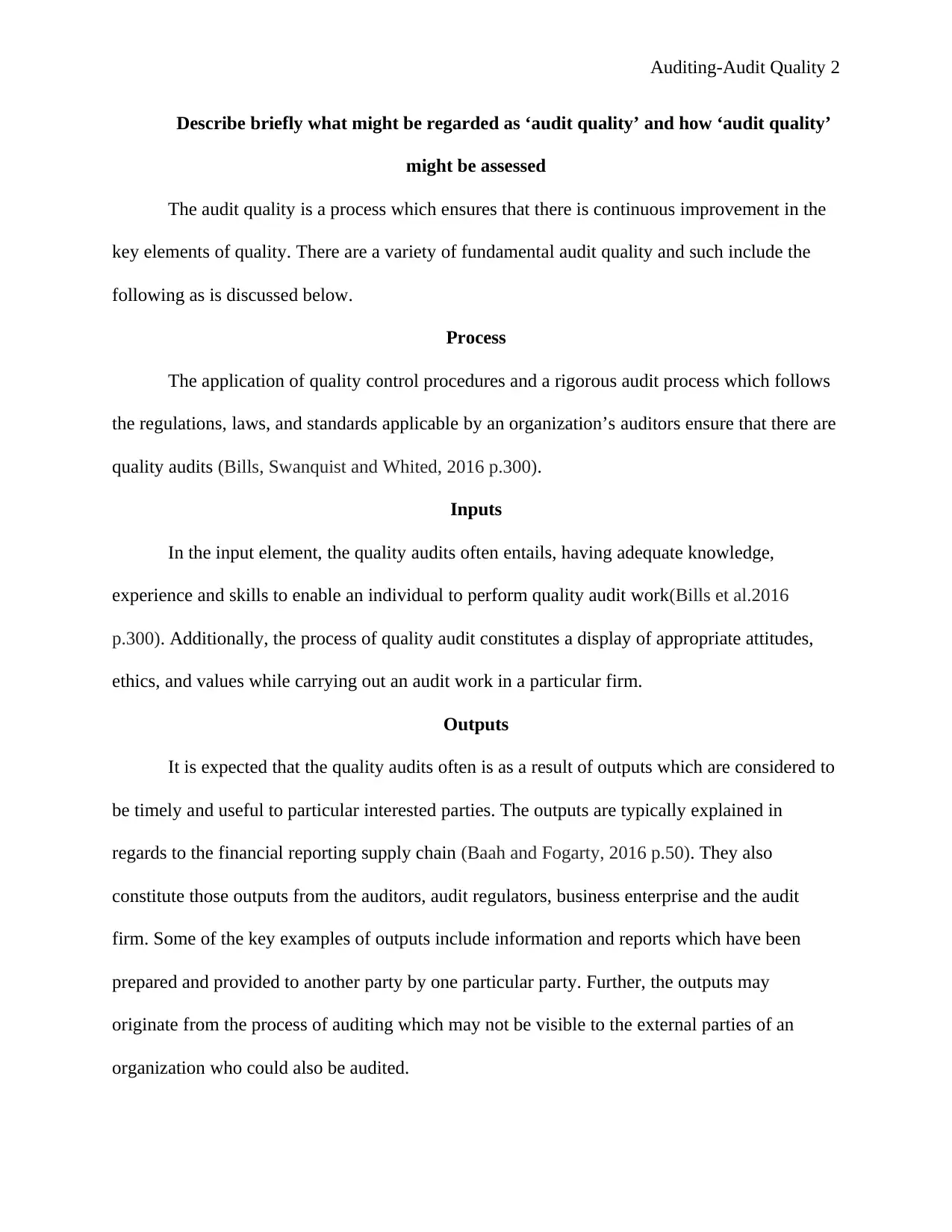
Auditing-Audit Quality 2
Describe briefly what might be regarded as ‘audit quality’ and how ‘audit quality’
might be assessed
The audit quality is a process which ensures that there is continuous improvement in the
key elements of quality. There are a variety of fundamental audit quality and such include the
following as is discussed below.
Process
The application of quality control procedures and a rigorous audit process which follows
the regulations, laws, and standards applicable by an organization’s auditors ensure that there are
quality audits (Bills, Swanquist and Whited, 2016 p.300).
Inputs
In the input element, the quality audits often entails, having adequate knowledge,
experience and skills to enable an individual to perform quality audit work(Bills et al.2016
p.300). Additionally, the process of quality audit constitutes a display of appropriate attitudes,
ethics, and values while carrying out an audit work in a particular firm.
Outputs
It is expected that the quality audits often is as a result of outputs which are considered to
be timely and useful to particular interested parties. The outputs are typically explained in
regards to the financial reporting supply chain (Baah and Fogarty, 2016 p.50). They also
constitute those outputs from the auditors, audit regulators, business enterprise and the audit
firm. Some of the key examples of outputs include information and reports which have been
prepared and provided to another party by one particular party. Further, the outputs may
originate from the process of auditing which may not be visible to the external parties of an
organization who could also be audited.
Describe briefly what might be regarded as ‘audit quality’ and how ‘audit quality’
might be assessed
The audit quality is a process which ensures that there is continuous improvement in the
key elements of quality. There are a variety of fundamental audit quality and such include the
following as is discussed below.
Process
The application of quality control procedures and a rigorous audit process which follows
the regulations, laws, and standards applicable by an organization’s auditors ensure that there are
quality audits (Bills, Swanquist and Whited, 2016 p.300).
Inputs
In the input element, the quality audits often entails, having adequate knowledge,
experience and skills to enable an individual to perform quality audit work(Bills et al.2016
p.300). Additionally, the process of quality audit constitutes a display of appropriate attitudes,
ethics, and values while carrying out an audit work in a particular firm.
Outputs
It is expected that the quality audits often is as a result of outputs which are considered to
be timely and useful to particular interested parties. The outputs are typically explained in
regards to the financial reporting supply chain (Baah and Fogarty, 2016 p.50). They also
constitute those outputs from the auditors, audit regulators, business enterprise and the audit
firm. Some of the key examples of outputs include information and reports which have been
prepared and provided to another party by one particular party. Further, the outputs may
originate from the process of auditing which may not be visible to the external parties of an
organization who could also be audited.
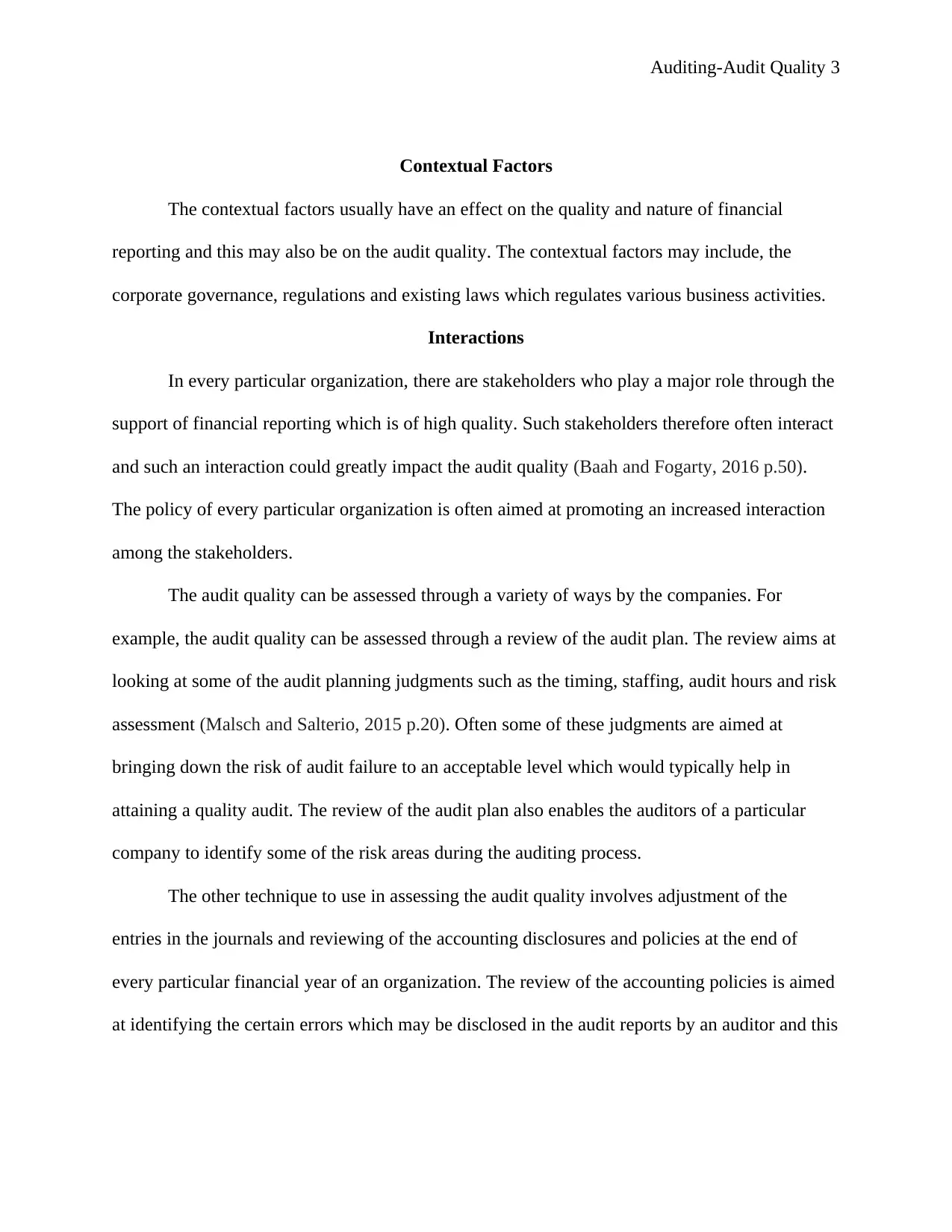
Auditing-Audit Quality 3
Contextual Factors
The contextual factors usually have an effect on the quality and nature of financial
reporting and this may also be on the audit quality. The contextual factors may include, the
corporate governance, regulations and existing laws which regulates various business activities.
Interactions
In every particular organization, there are stakeholders who play a major role through the
support of financial reporting which is of high quality. Such stakeholders therefore often interact
and such an interaction could greatly impact the audit quality (Baah and Fogarty, 2016 p.50).
The policy of every particular organization is often aimed at promoting an increased interaction
among the stakeholders.
The audit quality can be assessed through a variety of ways by the companies. For
example, the audit quality can be assessed through a review of the audit plan. The review aims at
looking at some of the audit planning judgments such as the timing, staffing, audit hours and risk
assessment (Malsch and Salterio, 2015 p.20). Often some of these judgments are aimed at
bringing down the risk of audit failure to an acceptable level which would typically help in
attaining a quality audit. The review of the audit plan also enables the auditors of a particular
company to identify some of the risk areas during the auditing process.
The other technique to use in assessing the audit quality involves adjustment of the
entries in the journals and reviewing of the accounting disclosures and policies at the end of
every particular financial year of an organization. The review of the accounting policies is aimed
at identifying the certain errors which may be disclosed in the audit reports by an auditor and this
Contextual Factors
The contextual factors usually have an effect on the quality and nature of financial
reporting and this may also be on the audit quality. The contextual factors may include, the
corporate governance, regulations and existing laws which regulates various business activities.
Interactions
In every particular organization, there are stakeholders who play a major role through the
support of financial reporting which is of high quality. Such stakeholders therefore often interact
and such an interaction could greatly impact the audit quality (Baah and Fogarty, 2016 p.50).
The policy of every particular organization is often aimed at promoting an increased interaction
among the stakeholders.
The audit quality can be assessed through a variety of ways by the companies. For
example, the audit quality can be assessed through a review of the audit plan. The review aims at
looking at some of the audit planning judgments such as the timing, staffing, audit hours and risk
assessment (Malsch and Salterio, 2015 p.20). Often some of these judgments are aimed at
bringing down the risk of audit failure to an acceptable level which would typically help in
attaining a quality audit. The review of the audit plan also enables the auditors of a particular
company to identify some of the risk areas during the auditing process.
The other technique to use in assessing the audit quality involves adjustment of the
entries in the journals and reviewing of the accounting disclosures and policies at the end of
every particular financial year of an organization. The review of the accounting policies is aimed
at identifying the certain errors which may be disclosed in the audit reports by an auditor and this
⊘ This is a preview!⊘
Do you want full access?
Subscribe today to unlock all pages.

Trusted by 1+ million students worldwide
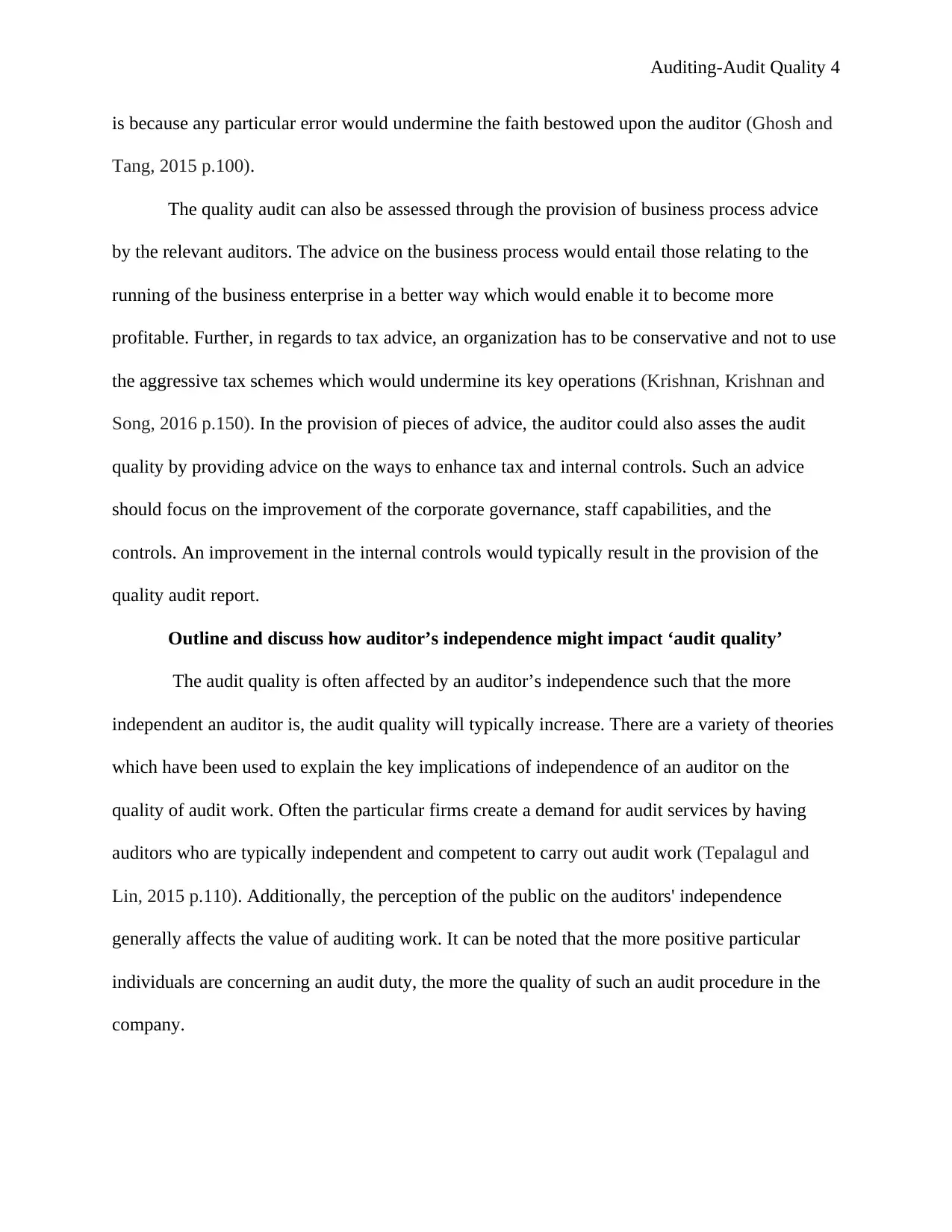
Auditing-Audit Quality 4
is because any particular error would undermine the faith bestowed upon the auditor (Ghosh and
Tang, 2015 p.100).
The quality audit can also be assessed through the provision of business process advice
by the relevant auditors. The advice on the business process would entail those relating to the
running of the business enterprise in a better way which would enable it to become more
profitable. Further, in regards to tax advice, an organization has to be conservative and not to use
the aggressive tax schemes which would undermine its key operations (Krishnan, Krishnan and
Song, 2016 p.150). In the provision of pieces of advice, the auditor could also asses the audit
quality by providing advice on the ways to enhance tax and internal controls. Such an advice
should focus on the improvement of the corporate governance, staff capabilities, and the
controls. An improvement in the internal controls would typically result in the provision of the
quality audit report.
Outline and discuss how auditor’s independence might impact ‘audit quality’
The audit quality is often affected by an auditor’s independence such that the more
independent an auditor is, the audit quality will typically increase. There are a variety of theories
which have been used to explain the key implications of independence of an auditor on the
quality of audit work. Often the particular firms create a demand for audit services by having
auditors who are typically independent and competent to carry out audit work (Tepalagul and
Lin, 2015 p.110). Additionally, the perception of the public on the auditors' independence
generally affects the value of auditing work. It can be noted that the more positive particular
individuals are concerning an audit duty, the more the quality of such an audit procedure in the
company.
is because any particular error would undermine the faith bestowed upon the auditor (Ghosh and
Tang, 2015 p.100).
The quality audit can also be assessed through the provision of business process advice
by the relevant auditors. The advice on the business process would entail those relating to the
running of the business enterprise in a better way which would enable it to become more
profitable. Further, in regards to tax advice, an organization has to be conservative and not to use
the aggressive tax schemes which would undermine its key operations (Krishnan, Krishnan and
Song, 2016 p.150). In the provision of pieces of advice, the auditor could also asses the audit
quality by providing advice on the ways to enhance tax and internal controls. Such an advice
should focus on the improvement of the corporate governance, staff capabilities, and the
controls. An improvement in the internal controls would typically result in the provision of the
quality audit report.
Outline and discuss how auditor’s independence might impact ‘audit quality’
The audit quality is often affected by an auditor’s independence such that the more
independent an auditor is, the audit quality will typically increase. There are a variety of theories
which have been used to explain the key implications of independence of an auditor on the
quality of audit work. Often the particular firms create a demand for audit services by having
auditors who are typically independent and competent to carry out audit work (Tepalagul and
Lin, 2015 p.110). Additionally, the perception of the public on the auditors' independence
generally affects the value of auditing work. It can be noted that the more positive particular
individuals are concerning an audit duty, the more the quality of such an audit procedure in the
company.
Paraphrase This Document
Need a fresh take? Get an instant paraphrase of this document with our AI Paraphraser
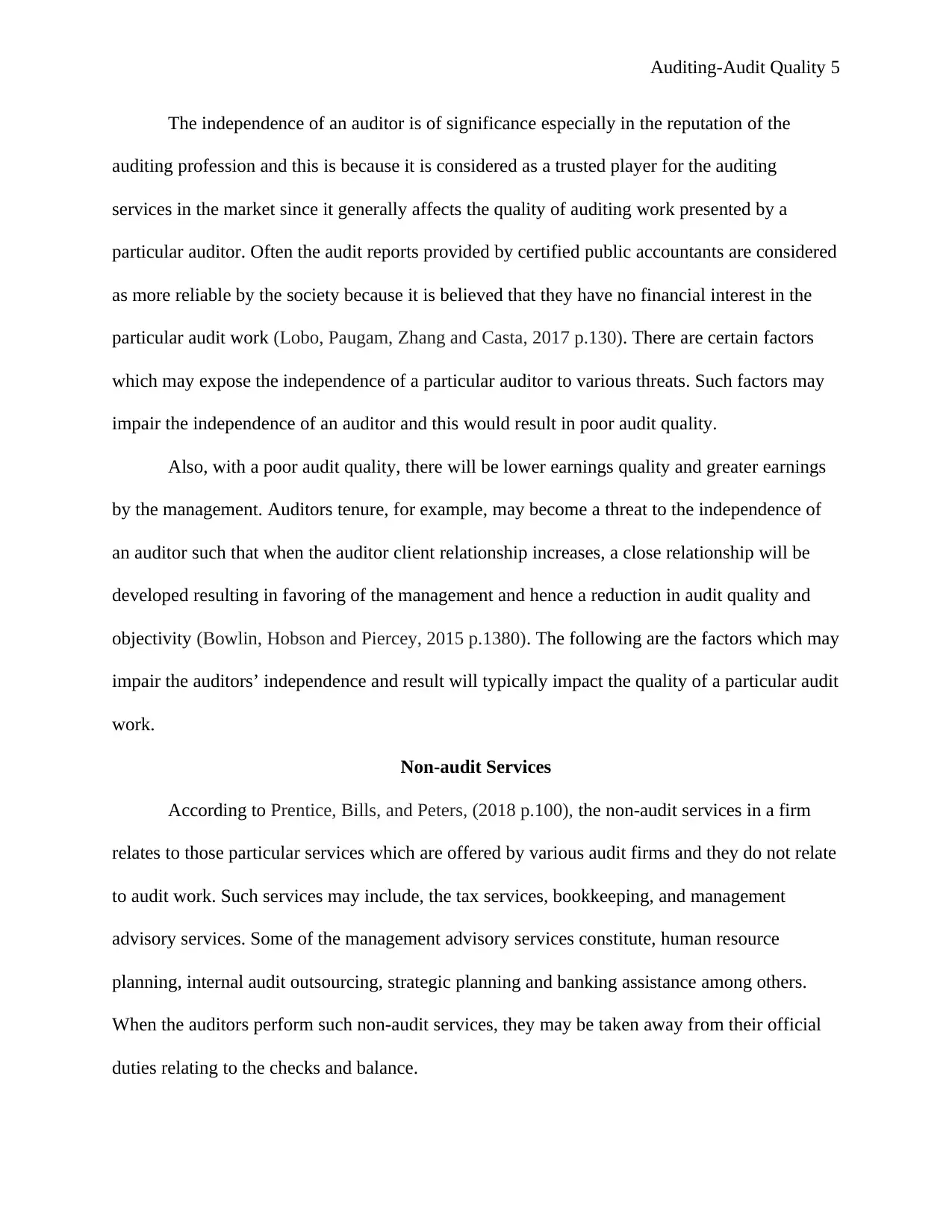
Auditing-Audit Quality 5
The independence of an auditor is of significance especially in the reputation of the
auditing profession and this is because it is considered as a trusted player for the auditing
services in the market since it generally affects the quality of auditing work presented by a
particular auditor. Often the audit reports provided by certified public accountants are considered
as more reliable by the society because it is believed that they have no financial interest in the
particular audit work (Lobo, Paugam, Zhang and Casta, 2017 p.130). There are certain factors
which may expose the independence of a particular auditor to various threats. Such factors may
impair the independence of an auditor and this would result in poor audit quality.
Also, with a poor audit quality, there will be lower earnings quality and greater earnings
by the management. Auditors tenure, for example, may become a threat to the independence of
an auditor such that when the auditor client relationship increases, a close relationship will be
developed resulting in favoring of the management and hence a reduction in audit quality and
objectivity (Bowlin, Hobson and Piercey, 2015 p.1380). The following are the factors which may
impair the auditors’ independence and result will typically impact the quality of a particular audit
work.
Non-audit Services
According to Prentice, Bills, and Peters, (2018 p.100), the non-audit services in a firm
relates to those particular services which are offered by various audit firms and they do not relate
to audit work. Such services may include, the tax services, bookkeeping, and management
advisory services. Some of the management advisory services constitute, human resource
planning, internal audit outsourcing, strategic planning and banking assistance among others.
When the auditors perform such non-audit services, they may be taken away from their official
duties relating to the checks and balance.
The independence of an auditor is of significance especially in the reputation of the
auditing profession and this is because it is considered as a trusted player for the auditing
services in the market since it generally affects the quality of auditing work presented by a
particular auditor. Often the audit reports provided by certified public accountants are considered
as more reliable by the society because it is believed that they have no financial interest in the
particular audit work (Lobo, Paugam, Zhang and Casta, 2017 p.130). There are certain factors
which may expose the independence of a particular auditor to various threats. Such factors may
impair the independence of an auditor and this would result in poor audit quality.
Also, with a poor audit quality, there will be lower earnings quality and greater earnings
by the management. Auditors tenure, for example, may become a threat to the independence of
an auditor such that when the auditor client relationship increases, a close relationship will be
developed resulting in favoring of the management and hence a reduction in audit quality and
objectivity (Bowlin, Hobson and Piercey, 2015 p.1380). The following are the factors which may
impair the auditors’ independence and result will typically impact the quality of a particular audit
work.
Non-audit Services
According to Prentice, Bills, and Peters, (2018 p.100), the non-audit services in a firm
relates to those particular services which are offered by various audit firms and they do not relate
to audit work. Such services may include, the tax services, bookkeeping, and management
advisory services. Some of the management advisory services constitute, human resource
planning, internal audit outsourcing, strategic planning and banking assistance among others.
When the auditors perform such non-audit services, they may be taken away from their official
duties relating to the checks and balance.
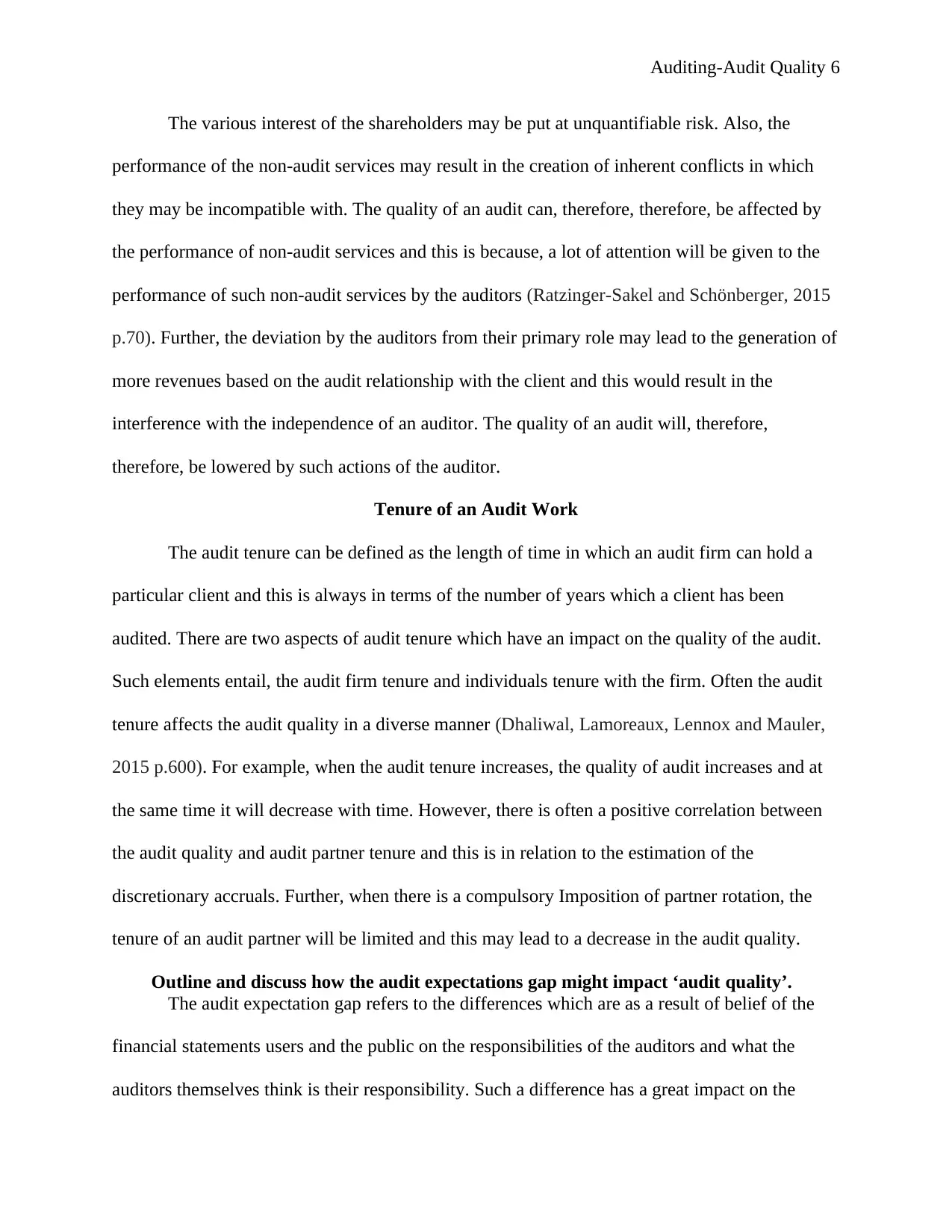
Auditing-Audit Quality 6
The various interest of the shareholders may be put at unquantifiable risk. Also, the
performance of the non-audit services may result in the creation of inherent conflicts in which
they may be incompatible with. The quality of an audit can, therefore, therefore, be affected by
the performance of non-audit services and this is because, a lot of attention will be given to the
performance of such non-audit services by the auditors (Ratzinger-Sakel and Schönberger, 2015
p.70). Further, the deviation by the auditors from their primary role may lead to the generation of
more revenues based on the audit relationship with the client and this would result in the
interference with the independence of an auditor. The quality of an audit will, therefore,
therefore, be lowered by such actions of the auditor.
Tenure of an Audit Work
The audit tenure can be defined as the length of time in which an audit firm can hold a
particular client and this is always in terms of the number of years which a client has been
audited. There are two aspects of audit tenure which have an impact on the quality of the audit.
Such elements entail, the audit firm tenure and individuals tenure with the firm. Often the audit
tenure affects the audit quality in a diverse manner (Dhaliwal, Lamoreaux, Lennox and Mauler,
2015 p.600). For example, when the audit tenure increases, the quality of audit increases and at
the same time it will decrease with time. However, there is often a positive correlation between
the audit quality and audit partner tenure and this is in relation to the estimation of the
discretionary accruals. Further, when there is a compulsory Imposition of partner rotation, the
tenure of an audit partner will be limited and this may lead to a decrease in the audit quality.
Outline and discuss how the audit expectations gap might impact ‘audit quality’.
The audit expectation gap refers to the differences which are as a result of belief of the
financial statements users and the public on the responsibilities of the auditors and what the
auditors themselves think is their responsibility. Such a difference has a great impact on the
The various interest of the shareholders may be put at unquantifiable risk. Also, the
performance of the non-audit services may result in the creation of inherent conflicts in which
they may be incompatible with. The quality of an audit can, therefore, therefore, be affected by
the performance of non-audit services and this is because, a lot of attention will be given to the
performance of such non-audit services by the auditors (Ratzinger-Sakel and Schönberger, 2015
p.70). Further, the deviation by the auditors from their primary role may lead to the generation of
more revenues based on the audit relationship with the client and this would result in the
interference with the independence of an auditor. The quality of an audit will, therefore,
therefore, be lowered by such actions of the auditor.
Tenure of an Audit Work
The audit tenure can be defined as the length of time in which an audit firm can hold a
particular client and this is always in terms of the number of years which a client has been
audited. There are two aspects of audit tenure which have an impact on the quality of the audit.
Such elements entail, the audit firm tenure and individuals tenure with the firm. Often the audit
tenure affects the audit quality in a diverse manner (Dhaliwal, Lamoreaux, Lennox and Mauler,
2015 p.600). For example, when the audit tenure increases, the quality of audit increases and at
the same time it will decrease with time. However, there is often a positive correlation between
the audit quality and audit partner tenure and this is in relation to the estimation of the
discretionary accruals. Further, when there is a compulsory Imposition of partner rotation, the
tenure of an audit partner will be limited and this may lead to a decrease in the audit quality.
Outline and discuss how the audit expectations gap might impact ‘audit quality’.
The audit expectation gap refers to the differences which are as a result of belief of the
financial statements users and the public on the responsibilities of the auditors and what the
auditors themselves think is their responsibility. Such a difference has a great impact on the
⊘ This is a preview!⊘
Do you want full access?
Subscribe today to unlock all pages.

Trusted by 1+ million students worldwide
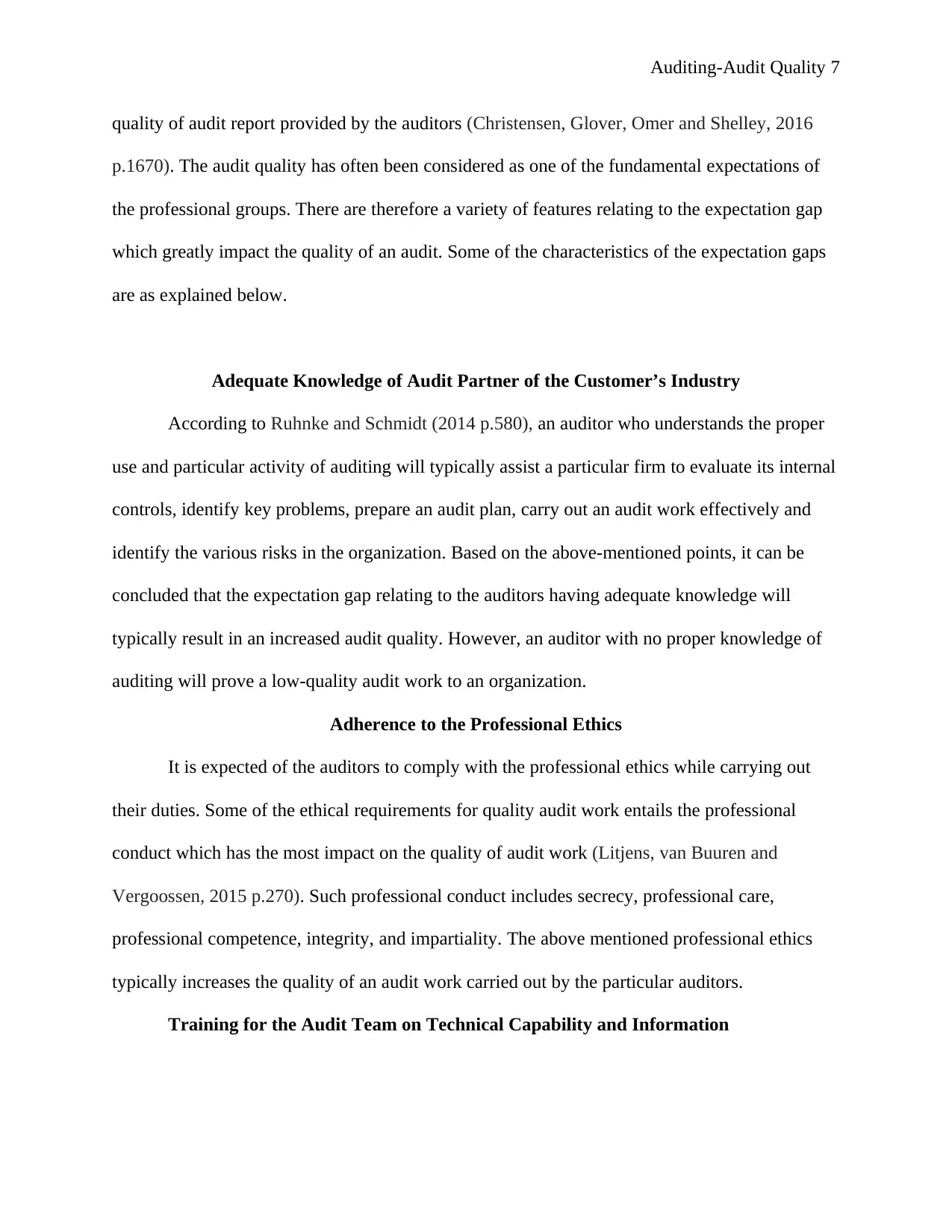
Auditing-Audit Quality 7
quality of audit report provided by the auditors (Christensen, Glover, Omer and Shelley, 2016
p.1670). The audit quality has often been considered as one of the fundamental expectations of
the professional groups. There are therefore a variety of features relating to the expectation gap
which greatly impact the quality of an audit. Some of the characteristics of the expectation gaps
are as explained below.
Adequate Knowledge of Audit Partner of the Customer’s Industry
According to Ruhnke and Schmidt (2014 p.580), an auditor who understands the proper
use and particular activity of auditing will typically assist a particular firm to evaluate its internal
controls, identify key problems, prepare an audit plan, carry out an audit work effectively and
identify the various risks in the organization. Based on the above-mentioned points, it can be
concluded that the expectation gap relating to the auditors having adequate knowledge will
typically result in an increased audit quality. However, an auditor with no proper knowledge of
auditing will prove a low-quality audit work to an organization.
Adherence to the Professional Ethics
It is expected of the auditors to comply with the professional ethics while carrying out
their duties. Some of the ethical requirements for quality audit work entails the professional
conduct which has the most impact on the quality of audit work (Litjens, van Buuren and
Vergoossen, 2015 p.270). Such professional conduct includes secrecy, professional care,
professional competence, integrity, and impartiality. The above mentioned professional ethics
typically increases the quality of an audit work carried out by the particular auditors.
Training for the Audit Team on Technical Capability and Information
quality of audit report provided by the auditors (Christensen, Glover, Omer and Shelley, 2016
p.1670). The audit quality has often been considered as one of the fundamental expectations of
the professional groups. There are therefore a variety of features relating to the expectation gap
which greatly impact the quality of an audit. Some of the characteristics of the expectation gaps
are as explained below.
Adequate Knowledge of Audit Partner of the Customer’s Industry
According to Ruhnke and Schmidt (2014 p.580), an auditor who understands the proper
use and particular activity of auditing will typically assist a particular firm to evaluate its internal
controls, identify key problems, prepare an audit plan, carry out an audit work effectively and
identify the various risks in the organization. Based on the above-mentioned points, it can be
concluded that the expectation gap relating to the auditors having adequate knowledge will
typically result in an increased audit quality. However, an auditor with no proper knowledge of
auditing will prove a low-quality audit work to an organization.
Adherence to the Professional Ethics
It is expected of the auditors to comply with the professional ethics while carrying out
their duties. Some of the ethical requirements for quality audit work entails the professional
conduct which has the most impact on the quality of audit work (Litjens, van Buuren and
Vergoossen, 2015 p.270). Such professional conduct includes secrecy, professional care,
professional competence, integrity, and impartiality. The above mentioned professional ethics
typically increases the quality of an audit work carried out by the particular auditors.
Training for the Audit Team on Technical Capability and Information
Paraphrase This Document
Need a fresh take? Get an instant paraphrase of this document with our AI Paraphraser
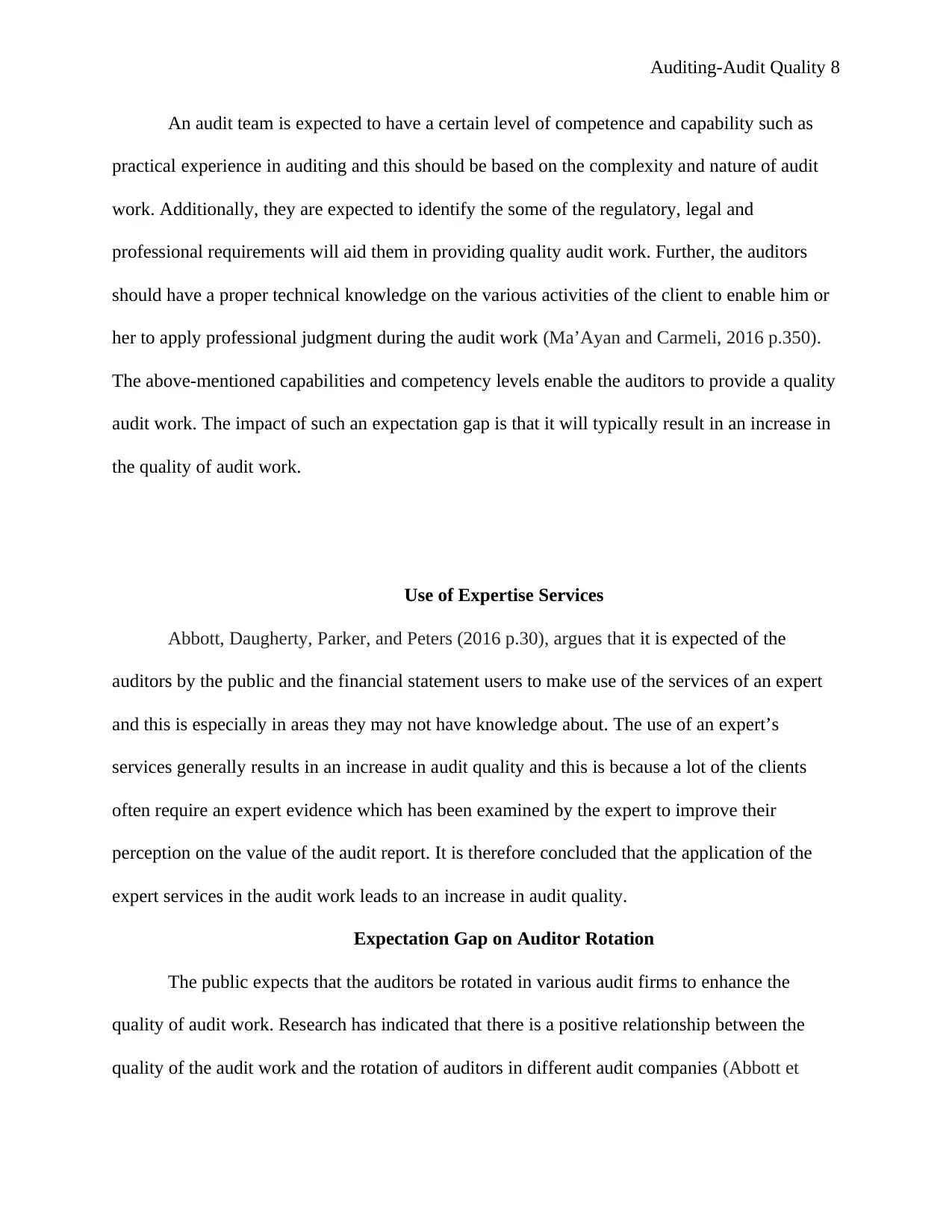
Auditing-Audit Quality 8
An audit team is expected to have a certain level of competence and capability such as
practical experience in auditing and this should be based on the complexity and nature of audit
work. Additionally, they are expected to identify the some of the regulatory, legal and
professional requirements will aid them in providing quality audit work. Further, the auditors
should have a proper technical knowledge on the various activities of the client to enable him or
her to apply professional judgment during the audit work (Ma’Ayan and Carmeli, 2016 p.350).
The above-mentioned capabilities and competency levels enable the auditors to provide a quality
audit work. The impact of such an expectation gap is that it will typically result in an increase in
the quality of audit work.
Use of Expertise Services
Abbott, Daugherty, Parker, and Peters (2016 p.30), argues that it is expected of the
auditors by the public and the financial statement users to make use of the services of an expert
and this is especially in areas they may not have knowledge about. The use of an expert’s
services generally results in an increase in audit quality and this is because a lot of the clients
often require an expert evidence which has been examined by the expert to improve their
perception on the value of the audit report. It is therefore concluded that the application of the
expert services in the audit work leads to an increase in audit quality.
Expectation Gap on Auditor Rotation
The public expects that the auditors be rotated in various audit firms to enhance the
quality of audit work. Research has indicated that there is a positive relationship between the
quality of the audit work and the rotation of auditors in different audit companies (Abbott et
An audit team is expected to have a certain level of competence and capability such as
practical experience in auditing and this should be based on the complexity and nature of audit
work. Additionally, they are expected to identify the some of the regulatory, legal and
professional requirements will aid them in providing quality audit work. Further, the auditors
should have a proper technical knowledge on the various activities of the client to enable him or
her to apply professional judgment during the audit work (Ma’Ayan and Carmeli, 2016 p.350).
The above-mentioned capabilities and competency levels enable the auditors to provide a quality
audit work. The impact of such an expectation gap is that it will typically result in an increase in
the quality of audit work.
Use of Expertise Services
Abbott, Daugherty, Parker, and Peters (2016 p.30), argues that it is expected of the
auditors by the public and the financial statement users to make use of the services of an expert
and this is especially in areas they may not have knowledge about. The use of an expert’s
services generally results in an increase in audit quality and this is because a lot of the clients
often require an expert evidence which has been examined by the expert to improve their
perception on the value of the audit report. It is therefore concluded that the application of the
expert services in the audit work leads to an increase in audit quality.
Expectation Gap on Auditor Rotation
The public expects that the auditors be rotated in various audit firms to enhance the
quality of audit work. Research has indicated that there is a positive relationship between the
quality of the audit work and the rotation of auditors in different audit companies (Abbott et
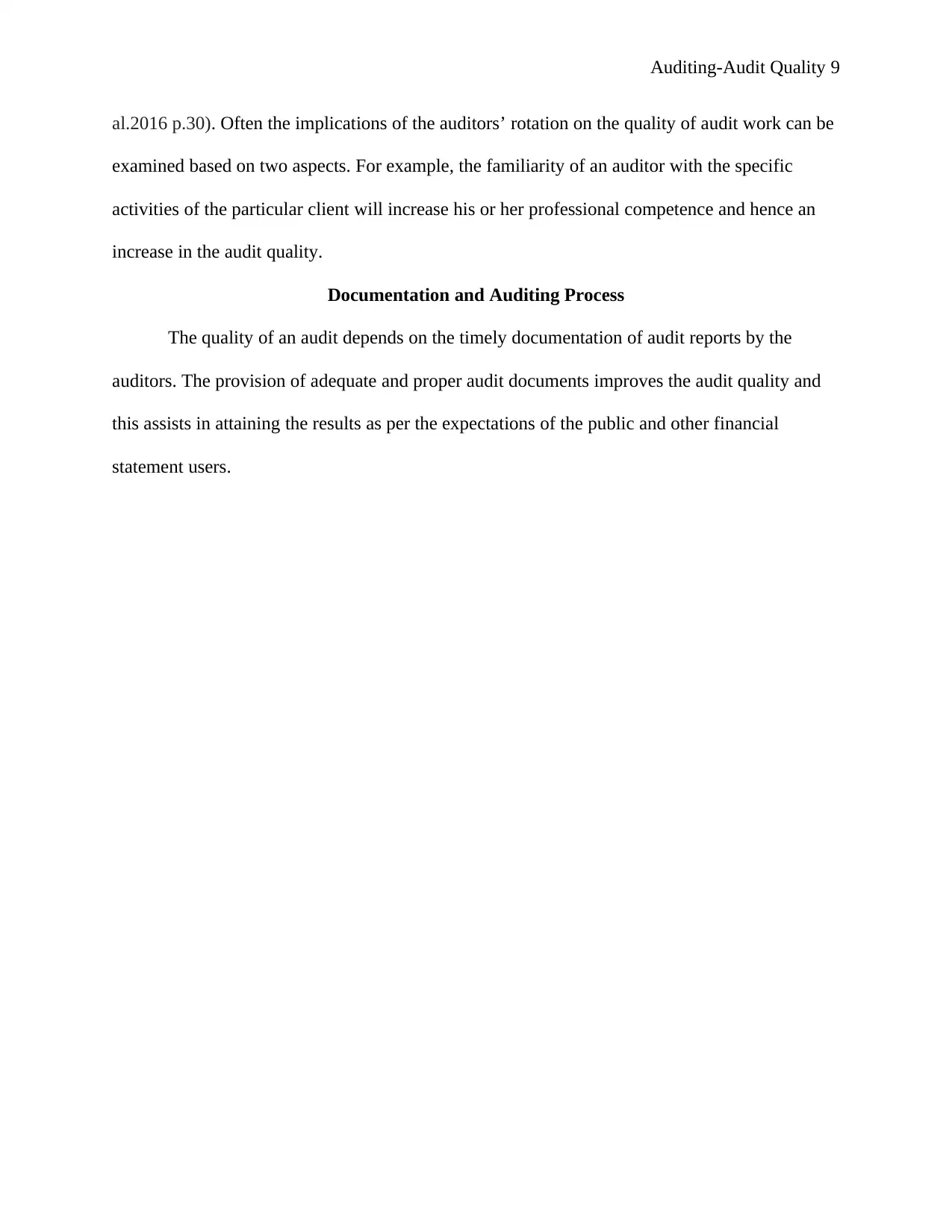
Auditing-Audit Quality 9
al.2016 p.30). Often the implications of the auditors’ rotation on the quality of audit work can be
examined based on two aspects. For example, the familiarity of an auditor with the specific
activities of the particular client will increase his or her professional competence and hence an
increase in the audit quality.
Documentation and Auditing Process
The quality of an audit depends on the timely documentation of audit reports by the
auditors. The provision of adequate and proper audit documents improves the audit quality and
this assists in attaining the results as per the expectations of the public and other financial
statement users.
al.2016 p.30). Often the implications of the auditors’ rotation on the quality of audit work can be
examined based on two aspects. For example, the familiarity of an auditor with the specific
activities of the particular client will increase his or her professional competence and hence an
increase in the audit quality.
Documentation and Auditing Process
The quality of an audit depends on the timely documentation of audit reports by the
auditors. The provision of adequate and proper audit documents improves the audit quality and
this assists in attaining the results as per the expectations of the public and other financial
statement users.
⊘ This is a preview!⊘
Do you want full access?
Subscribe today to unlock all pages.

Trusted by 1+ million students worldwide
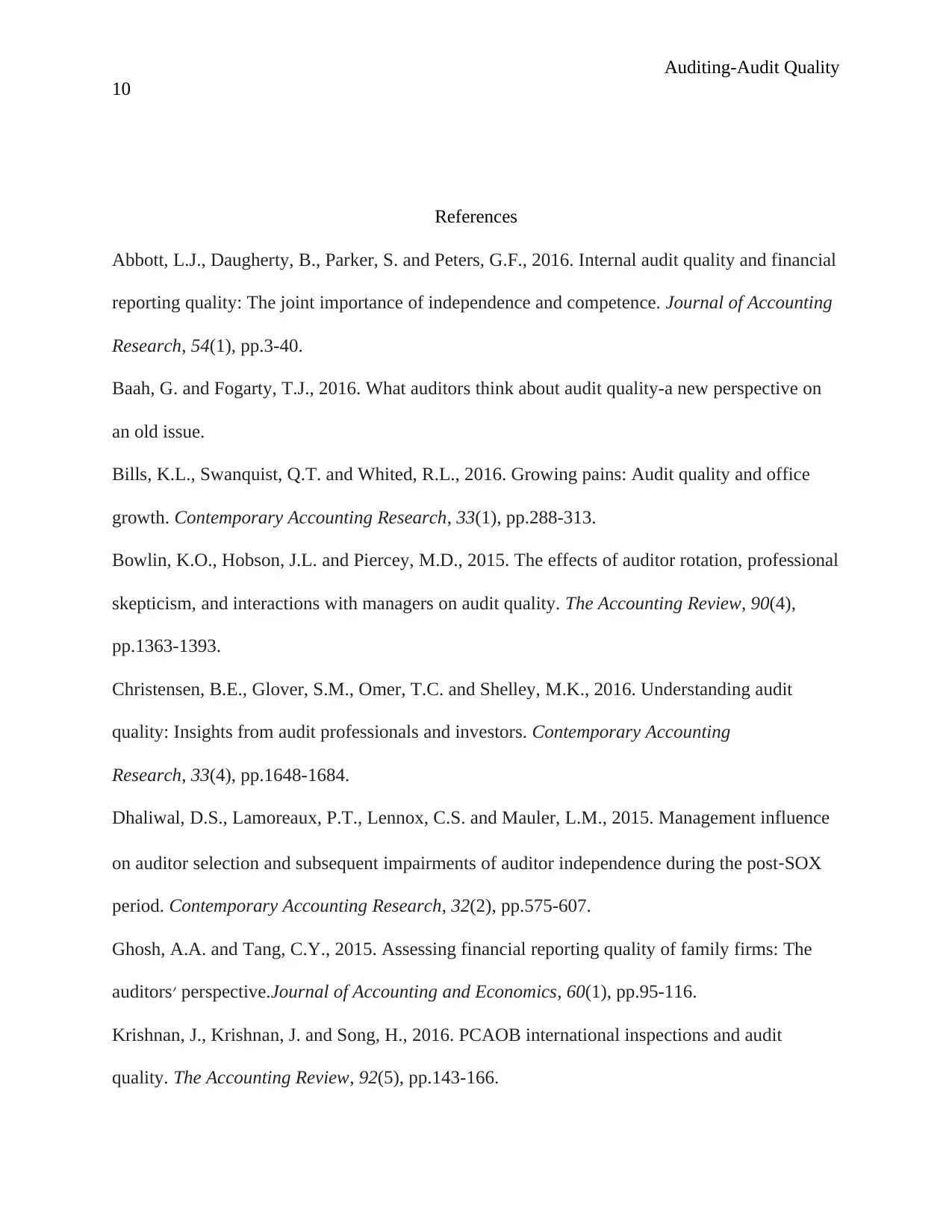
Auditing-Audit Quality
10
References
Abbott, L.J., Daugherty, B., Parker, S. and Peters, G.F., 2016. Internal audit quality and financial
reporting quality: The joint importance of independence and competence. Journal of Accounting
Research, 54(1), pp.3-40.
Baah, G. and Fogarty, T.J., 2016. What auditors think about audit quality-a new perspective on
an old issue.
Bills, K.L., Swanquist, Q.T. and Whited, R.L., 2016. Growing pains: Audit quality and office
growth. Contemporary Accounting Research, 33(1), pp.288-313.
Bowlin, K.O., Hobson, J.L. and Piercey, M.D., 2015. The effects of auditor rotation, professional
skepticism, and interactions with managers on audit quality. The Accounting Review, 90(4),
pp.1363-1393.
Christensen, B.E., Glover, S.M., Omer, T.C. and Shelley, M.K., 2016. Understanding audit
quality: Insights from audit professionals and investors. Contemporary Accounting
Research, 33(4), pp.1648-1684.
Dhaliwal, D.S., Lamoreaux, P.T., Lennox, C.S. and Mauler, L.M., 2015. Management influence
on auditor selection and subsequent impairments of auditor independence during the post‐SOX
period. Contemporary Accounting Research, 32(2), pp.575-607.
Ghosh, A.A. and Tang, C.Y., 2015. Assessing financial reporting quality of family firms: The
auditors׳ perspective.Journal of Accounting and Economics, 60(1), pp.95-116.
Krishnan, J., Krishnan, J. and Song, H., 2016. PCAOB international inspections and audit
quality. The Accounting Review, 92(5), pp.143-166.
10
References
Abbott, L.J., Daugherty, B., Parker, S. and Peters, G.F., 2016. Internal audit quality and financial
reporting quality: The joint importance of independence and competence. Journal of Accounting
Research, 54(1), pp.3-40.
Baah, G. and Fogarty, T.J., 2016. What auditors think about audit quality-a new perspective on
an old issue.
Bills, K.L., Swanquist, Q.T. and Whited, R.L., 2016. Growing pains: Audit quality and office
growth. Contemporary Accounting Research, 33(1), pp.288-313.
Bowlin, K.O., Hobson, J.L. and Piercey, M.D., 2015. The effects of auditor rotation, professional
skepticism, and interactions with managers on audit quality. The Accounting Review, 90(4),
pp.1363-1393.
Christensen, B.E., Glover, S.M., Omer, T.C. and Shelley, M.K., 2016. Understanding audit
quality: Insights from audit professionals and investors. Contemporary Accounting
Research, 33(4), pp.1648-1684.
Dhaliwal, D.S., Lamoreaux, P.T., Lennox, C.S. and Mauler, L.M., 2015. Management influence
on auditor selection and subsequent impairments of auditor independence during the post‐SOX
period. Contemporary Accounting Research, 32(2), pp.575-607.
Ghosh, A.A. and Tang, C.Y., 2015. Assessing financial reporting quality of family firms: The
auditors׳ perspective.Journal of Accounting and Economics, 60(1), pp.95-116.
Krishnan, J., Krishnan, J. and Song, H., 2016. PCAOB international inspections and audit
quality. The Accounting Review, 92(5), pp.143-166.
Paraphrase This Document
Need a fresh take? Get an instant paraphrase of this document with our AI Paraphraser
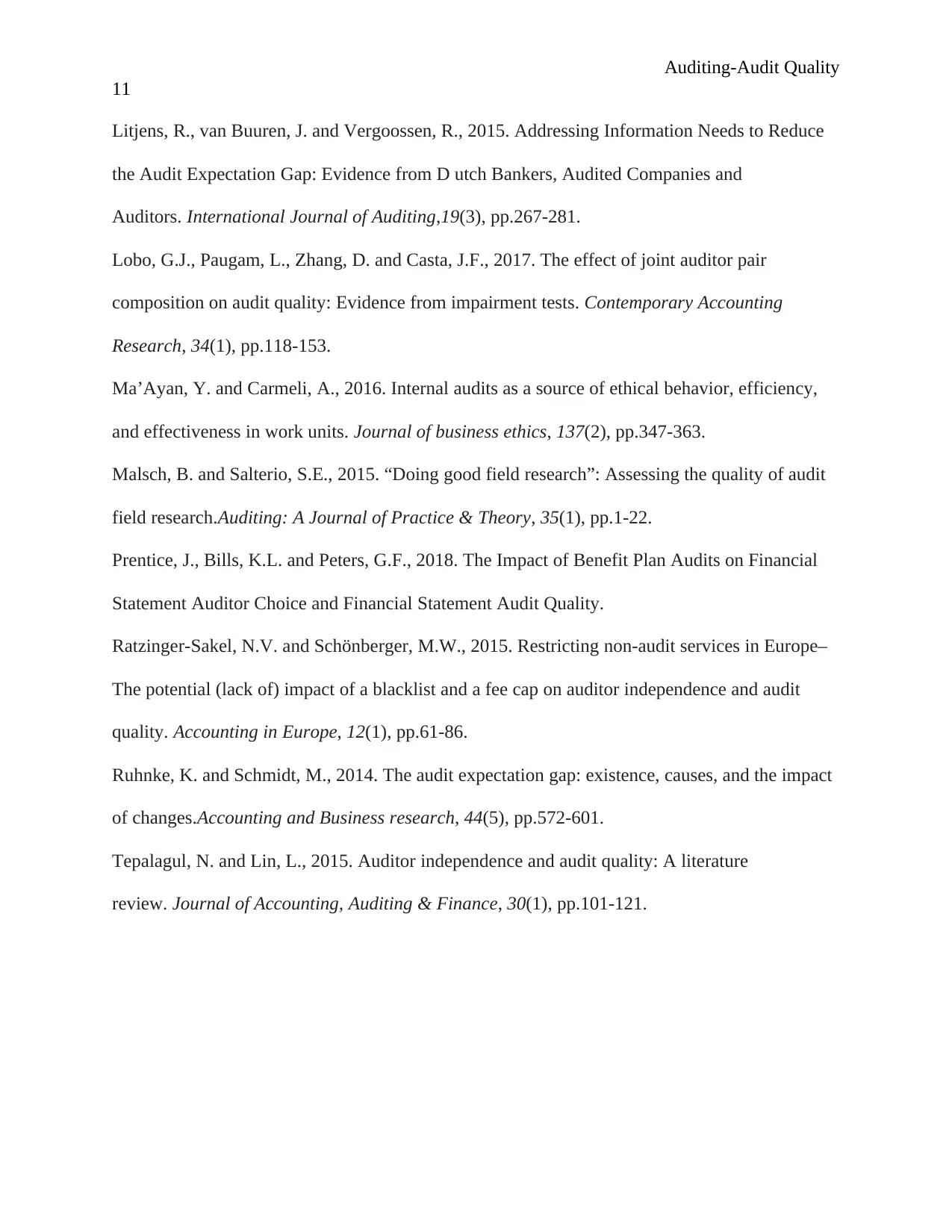
Auditing-Audit Quality
11
Litjens, R., van Buuren, J. and Vergoossen, R., 2015. Addressing Information Needs to Reduce
the Audit Expectation Gap: Evidence from D utch Bankers, Audited Companies and
Auditors. International Journal of Auditing,19(3), pp.267-281.
Lobo, G.J., Paugam, L., Zhang, D. and Casta, J.F., 2017. The effect of joint auditor pair
composition on audit quality: Evidence from impairment tests. Contemporary Accounting
Research, 34(1), pp.118-153.
Ma’Ayan, Y. and Carmeli, A., 2016. Internal audits as a source of ethical behavior, efficiency,
and effectiveness in work units. Journal of business ethics, 137(2), pp.347-363.
Malsch, B. and Salterio, S.E., 2015. “Doing good field research”: Assessing the quality of audit
field research.Auditing: A Journal of Practice & Theory, 35(1), pp.1-22.
Prentice, J., Bills, K.L. and Peters, G.F., 2018. The Impact of Benefit Plan Audits on Financial
Statement Auditor Choice and Financial Statement Audit Quality.
Ratzinger-Sakel, N.V. and Schönberger, M.W., 2015. Restricting non-audit services in Europe–
The potential (lack of) impact of a blacklist and a fee cap on auditor independence and audit
quality. Accounting in Europe, 12(1), pp.61-86.
Ruhnke, K. and Schmidt, M., 2014. The audit expectation gap: existence, causes, and the impact
of changes.Accounting and Business research, 44(5), pp.572-601.
Tepalagul, N. and Lin, L., 2015. Auditor independence and audit quality: A literature
review. Journal of Accounting, Auditing & Finance, 30(1), pp.101-121.
11
Litjens, R., van Buuren, J. and Vergoossen, R., 2015. Addressing Information Needs to Reduce
the Audit Expectation Gap: Evidence from D utch Bankers, Audited Companies and
Auditors. International Journal of Auditing,19(3), pp.267-281.
Lobo, G.J., Paugam, L., Zhang, D. and Casta, J.F., 2017. The effect of joint auditor pair
composition on audit quality: Evidence from impairment tests. Contemporary Accounting
Research, 34(1), pp.118-153.
Ma’Ayan, Y. and Carmeli, A., 2016. Internal audits as a source of ethical behavior, efficiency,
and effectiveness in work units. Journal of business ethics, 137(2), pp.347-363.
Malsch, B. and Salterio, S.E., 2015. “Doing good field research”: Assessing the quality of audit
field research.Auditing: A Journal of Practice & Theory, 35(1), pp.1-22.
Prentice, J., Bills, K.L. and Peters, G.F., 2018. The Impact of Benefit Plan Audits on Financial
Statement Auditor Choice and Financial Statement Audit Quality.
Ratzinger-Sakel, N.V. and Schönberger, M.W., 2015. Restricting non-audit services in Europe–
The potential (lack of) impact of a blacklist and a fee cap on auditor independence and audit
quality. Accounting in Europe, 12(1), pp.61-86.
Ruhnke, K. and Schmidt, M., 2014. The audit expectation gap: existence, causes, and the impact
of changes.Accounting and Business research, 44(5), pp.572-601.
Tepalagul, N. and Lin, L., 2015. Auditor independence and audit quality: A literature
review. Journal of Accounting, Auditing & Finance, 30(1), pp.101-121.
1 out of 11
Your All-in-One AI-Powered Toolkit for Academic Success.
+13062052269
info@desklib.com
Available 24*7 on WhatsApp / Email
![[object Object]](/_next/static/media/star-bottom.7253800d.svg)
Unlock your academic potential
Copyright © 2020–2025 A2Z Services. All Rights Reserved. Developed and managed by ZUCOL.
